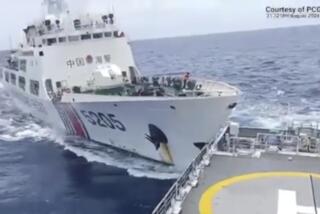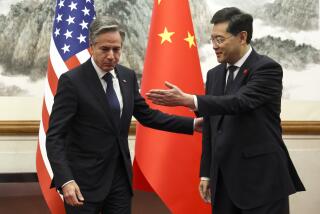China’s snub of U.S. vessel sends murky message
- Share via
BEIJING — China’s decision to block the U.S. Navy aircraft carrier Kitty Hawk from a long-planned Thanksgiving visit to Hong Kong, before relenting 24 hours later “on humanitarian grounds,” had all the markings of a diplomatic slap in the face, analysts say. It just wasn’t terribly clear whose face it was aimed at.
Word spread Wednesday afternoon that China’s Foreign Ministry had suddenly and inexplicably blocked a five-day visit by the giant vessel and its strike group, despite prior approval and weeks of planning.
A day later, Chinese Foreign Ministry spokesman Liu Jianchao told journalists that Beijing would relent, saying its change of heart was “a decision out of humanitarian consideration only.” Repeated efforts by foreign reporters to get him to explain the reversal failed.
“It’s a little odd,” said Eric Hagt, editor of China Security journal, a defense publication based in Washington. “It all seems rather unforeseen and unknowable.”
China’s Defense Ministry offered no public statement. Nor, said U.S. military officials, did it provide any back-channel explanation.
The Chinese turnaround came too late, said Lt. Cmdr. John Filostrat, a spokesman with the U.S. Pacific Fleet in Hawaii. The Kitty Hawk waited as long as it could, but logistics and bad weather forced it to leave.
The decision was not intended as some sort of U.S. counter-snub, he added. “It’s now en route to its base in Yokosuka, Japan.”
Pundits near and far sought to explain what appeared to be behind the Chinese government’s blunt yet hazy message.
Theories included anger over President Bush’s recent meeting with the Dalai Lama, the exiled spiritual leader of Chinese-held Tibet; displeasure over an announced $940-million U.S. upgrade to Taiwan’s Patriot II antimissile shield; a desire to send a message before an imminent Hong Kong election; and pique over a U.S. report that criticized Chinese espionage activities.
One reason China may have reversed itself was the prospect of a public relations calamity in the making, although in the end the damage was done. About 8,000 American sailors face several glum days at sea, after hundreds of their family members traveled to Hong Kong from Japan and the United States to meet them.
“Wives, newborn babies, are all sitting at Fenwick Pier,” said Paul Buxton, manager of Hong Kong’s Quarterdeck Club restaurant, which has a contract to feed and entertain the hungry hordes.
This is not the only time recently that China has made a military move without apparently considering its public relations implications. In January, the Foreign Ministry was caught flat-footed when the People’s Liberation Army destroyed an aging satellite, spewing debris in space and sparking questions about the PLA’s intentions, why there was no warning and even whether China’s senior leadership had been fully informed in advance.
The snafu calls into question whether a proposed military hotline between the U.S. and China would be worth the effort, said Larry M. Wortzel, a former U.S. military attache in Beijing.
Amid the head-scratching, some praised this week’s moves, even if they too were uncertain about the intent.
“My guess is the U.S. did something that wasn’t so friendly toward us,” said Ni Lexiong, a military expert with the Shanghai Institute of Political Science and Law. “It’s good to let them know in a rather abrupt way, otherwise they might not notice.”
Whatever the reason for this week’s flip-flop, a few things stand out, analysts said. Beijing is clearly not happy with U.S.-Chinese military relations, for whatever reason.
“It’s become routine to have the Kitty Hawk visit Hong Kong,” said Andrew Yang, secretary-general of the Taiwanese-based Chinese Council of Advanced Policy Studies. “So this sends a strong message to the U.S.”
The incident also suggests both that China doesn’t always speak with one voice and that it is increasingly willing to play the nationalism card, some said.
“Sometimes the Chinese government gives us an example of how it is not a monolithic organization,” said David Wolf, head of a strategic public relations firm in Beijing. “And nationalism is an excellent way to unify everyone behind one guy.”
For Buxton, whose restaurant now faces the prospect of disposing of 1,000 pounds of turkey, 1,200 pounds of coleslaw, 100,000 hamburger buns and 3,000 pizzas, the experience has been something of a financial disaster.
“This whole thing is unbelievable,” he said. “And everyone says it’s not their fault. What can I do, send a chit to the PLA?”
--
Yin Lijin of The Times’ Beijing Bureau contributed to this report.
More to Read
Sign up for Essential California
The most important California stories and recommendations in your inbox every morning.
You may occasionally receive promotional content from the Los Angeles Times.










